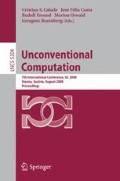Abstract
In this paper we will try to understand how oracles and advice functions, which are mathematical abstractions in the theory of computability and complexity, can be seen as physical measurements in Classical Physics. First, we consider how physical measurements are a natural external source of information to an algorithmic computation, using a simple and engaging case study, namely: Hoyle’s algorithm for calculating eclipses at Stonehenge. Next, we argue that oracles and advice functions can help us understand how the structure of space and time has information content that can be processed by Turing machines. Using an advanced case study from Newtonian kinematics, we show that non-uniform complexity is an adequate framework for classifying feasible computations by Turing machines interacting with an oracle in Nature, and that by classifying the information content of such a natural oracle, using Kolmogorov complexity, we obtain a hierarchical structure based on measurements, advice classes and information.
Access this chapter
Tax calculation will be finalised at checkout
Purchases are for personal use only
Preview
Unable to display preview. Download preview PDF.
References
Balcázar, J.L., Días, J., Gabarró, J.: Structural Complexity I, 2nd edn. Springer, Heidelberg (1995)
Balcázar, J.L., Gavaldà, R., Hermo, M.: Compressibility of infinite binary sequences. In: Sorbi, A. (ed.) Complexity, logic, and recursion theory. Lecture notes in pure and applied mathematics, vol. 187, pp. 1175–1183. Marcel Dekker, Inc., New York (1997)
Balcázar, J.L., Gavaldà, R., Siegelmann, H.: Computational power of neural networks: a characterization in terms of Kolmogorov complexity. IEEE Transactions on Information Theory 43(4), 1175–1183 (1997)
Balcázar, J.L., Gavaldà, R., Siegelmann, H., Sontag, E.D.: Some structural complexity aspects of neural computation. In: Proceedings of the Eighth IEEE Structure in Complexity Theory Conference, pp. 253–265. IEEE Computer Society, Los Alamitos (1993)
Beggs, E., Costa, J.F., Loff, B., Tucker, J.: On the complexity of measurement in classical physics. In: Agrawal, M., Du, D., Duan, Z., Li, A. (eds.) TAMC 2008. LNCS, vol. 4978, pp. 20–30. Springer, Heidelberg (2008)
Beggs, E., Costa, J.F., Loff, B., Tucker, J.: Computational complexity with experiments as oracles. Proc. Royal Society, Ser. A (in press)
Beggs, E., Tucker, J.: Experimental computation of real numbers by Newtonian machines. Proc. Royal Society, Ser. A 463(2082), 1541–1561 (2007)
Calude, C.: Algorithmic randomness, quantum physics, and incompleteness. In: Margenstern, M. (ed.) MCU 2004. LNCS, vol. 3354, pp. 1–17. Springer, Heidelberg (2005)
Cooper, B., Odifreddi, P.: Incomputability in Nature. In: Cooper, B., Goncharov, S. (eds.) Computability and Models, Perspectives East and West. University series in mathematics, pp. 137–160. Springer, Heidelberg (2003)
Copeland, J.: The Church–Turing thesis. In: Zalta, E. (ed.) The Stanford Enciclopedia of Phylosophy (published, 2002), http://plato.stanford.edu/archives/fall2002/entries/church-turing/
Copeland, J., Proudfoot, D.: Alan Turing’s forgotten ideas in Computer Science. Scientific American 280, 99–103 (1999)
Davis, M.: The myth of hypercomputation. In: Teuscher, C. (ed.) Alan Turing: the life and legacy of a great thinker, pp. 195–212. Springer, Heidelberg (2006)
Hodges, A.: The professors and the brainstorms (published, 1999), http://www.turing.org.uk/philosophy/sciam.html
Hoyle, F.: From Stonehenge to Modern Cosmology. W.H. Freeman, New York (1972)
Kobayashi, K.: On compressibility of infinite sequences. Technical Report C–34, Research Reports on Information Sciences (1981)
Loveland, D.W.: A variant of the Kolmogorov concept of complexity. Information and Control 15, 115–133 (1969)
Newham, C.A.: The Astronomical Significance of Stonehenge. Coats and Parker Ltd (2000) (First published, 1972)
Penrose, R.: The Emperor’s New Mind. Oxford University Press, Oxford (1989)
Penrose, R.: Shadows of the Mind. Oxford University Press, Oxford (1994)
Siegelmann, H.T.: Neural Networks and Analog Computation: Beyond the Turing Limit. Birkhäuser, Basel (1999)
Tucker, J.V., Zucker, J.I.: Computable functions and semicomputable sets on many sorted algebras. In: Abramsky, S., Gabbay, D., Maibaum, T. (eds.) Handbook of Logic for Computer Science. University Series in Mathematics, vol. V, pp. 317–523. Oxford University Press, Oxford (2000)
Tucker, J.V., Zucker, J.I.: Abstract versus concrete computation on metric partial algebras. ACM Transactions on Computational Logic 5, 611–668 (2004)
Author information
Authors and Affiliations
Editor information
Rights and permissions
Copyright information
© 2008 Springer-Verlag Berlin Heidelberg
About this paper
Cite this paper
Beggs, E., Costa, J.F., Loff, B., Tucker, J.V. (2008). Oracles and Advice as Measurements. In: Calude, C.S., Costa, J.F., Freund, R., Oswald, M., Rozenberg, G. (eds) Unconventional Computing. UC 2008. Lecture Notes in Computer Science, vol 5204. Springer, Berlin, Heidelberg. https://doi.org/10.1007/978-3-540-85194-3_6
Download citation
DOI: https://doi.org/10.1007/978-3-540-85194-3_6
Publisher Name: Springer, Berlin, Heidelberg
Print ISBN: 978-3-540-85193-6
Online ISBN: 978-3-540-85194-3
eBook Packages: Computer ScienceComputer Science (R0)

